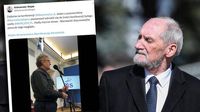On April 3, 2025, a press conference held by Antoni Macierewicz, the former Minister of National Defense, sparked a heated exchange in the Sejm, Poland's parliament. Macierewicz was there to defend Wacław B., the former head of the Smoleńsk sub-commission, who is facing charges for allegedly obstructing the investigation into the 2010 Smoleńsk catastrophe. During the conference, Macierewicz labeled Wacław B. as a "prominent scientist and competent person," asserting that the actions of the prosecutor's office were nothing more than "criminal propaganda" aimed at "defending Putin" and misleading the Polish public.
"What the prosecutor's office is doing to Mr. Wacław B. is simply shocking," Macierewicz stated, emphasizing his belief that the charges are baseless and absurd. He described Wacław B. as one of the leading experts in aviation, insisting that there are no grounds for any criminal allegations against him. Macierewicz's defense of Wacław B. comes at a time when the prosecutor's office has announced its intention to formally charge him for obstructing the ongoing investigation into the tragic events of April 2010, when a plane crash resulted in the deaths of numerous Polish officials, including President Lech Kaczyński.
Following Macierewicz's remarks, an unexpected confrontation unfolded. A Sejm employee, identified as a camera operator, stepped up to the microphone to challenge Macierewicz's statements. "What you are saying is simply untrue," the operator asserted, urging the former minister not to "stir up these matters again" because of the suffering it causes to the families affected by the tragedy. He added, "People suffer from it, whole families suffer." This direct confrontation highlighted the deep divisions surrounding the Smoleńsk catastrophe, a topic that continues to polarize Polish society even 15 years after the event.
The operator did not hold back, criticizing Macierewicz's appearance and stating, "This hatred has led you to such an appearance." Macierewicz, in turn, dismissed the operator's comments, replying, "You are talking nonsense." The exchange underscored the emotional weight of the Smoleńsk tragedy, which remains a sensitive issue in Poland.
In the context of the prosecutor's actions, it was revealed that Wacław B. has been summoned to the National Prosecutor's Office in the first half of April to face charges and be questioned as a suspect. According to the National Prosecutor's Office, evidence has sufficiently justified the suspicion that Wacław B. committed a crime by obstructing criminal proceedings related to the Smoleńsk investigation.
During the press conference, Macierewicz expressed his outrage over the prosecutor's decision to charge Wacław B. with aiding an offender, calling it "insane propaganda" designed to mislead the Polish nation and protect Russian interests. He further claimed that the narrative surrounding the Smoleńsk catastrophe has been manipulated by political figures like Donald Tusk, whom he accused of making erroneous statements regarding the incident.
Specifically, Macierewicz took aim at former Foreign Minister Radosław Sikorski, asserting that Sikorski had lied about the circumstances of the crash, which he claimed was a result of a deliberate act rather than an accident. Macierewicz has long maintained that the Smoleńsk catastrophe was not merely a tragic accident but rather a politically motivated assassination, a claim that has been met with skepticism by many.
Despite the passage of time, the Smoleńsk tragedy continues to evoke strong emotions and varying interpretations among the Polish public. The confrontation at Macierewicz's press conference is a testament to the ongoing divisions in Poland regarding this sensitive topic. The camera operator's intervention serves as a reminder that for many, the events of that fateful day in April 2010 are not just historical facts but deeply personal experiences that still affect families today.
As the legal proceedings against Wacław B. unfold, it remains to be seen how this will impact the ongoing discourse surrounding the Smoleńsk catastrophe. Macierewicz's bold defense of Wacław B. could galvanize support among those who share his views, but it also risks further polarizing an already divided public.
In the backdrop of this controversy, the Polish government continues to grapple with the legacy of the Smoleńsk tragedy and its implications for national politics. The investigation into the crash has been marked by allegations of misconduct, political maneuvering, and a struggle for narrative control, making it a focal point of contention in Polish society.
As the situation develops, the voices of those affected by the tragedy, like the Sejm employee who confronted Macierewicz, will likely continue to resonate in the public discourse, reminding all of the human cost of political conflict.






